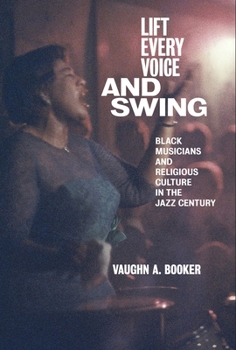Lift Every Voice and Swing: Black Musicians and Religious Culture in the Jazz Century
Winner of the 2022 Gustave O. Arlt Award in the Humanities, award by by the Council of Graduate Schools
Explores the role of jazz celebrities like Ella Fitzgerald, Cab Calloway, Duke Ellington, and Mary Lou Williams as representatives of African American religion in the twentieth century Beginning in the 1920s, the Jazz Age propelled Black swing artists into national celebrity. Many took on the role of race representatives, and were able to leverage their popularity toward achieving social progress for other African Americans. In Lift Every Voice and Swing, Vaughn A. Booker argues that with the emergence of these popular jazz figures, who came from a culture shaped by Black Protestantism, religious authority for African Americans found a place and spokespeople outside of traditional Afro-Protestant institutions and religious life. Popular Black jazz professionals--such as Ella Fitzgerald, Cab Calloway, Duke Ellington, and Mary Lou Williams--inherited religious authority though they were not official religious leaders. Some of these artists put forward a religious culture in the mid-twentieth century by releasing religious recordings and putting on religious concerts, and their work came to be seen as integral to the Black religious ethos.Booker documents this transformative era in religious expression, in which jazz musicians embodied religious beliefs and practices that echoed and diverged from the predominant African American religious culture. He draws on the heretofore unexamined private religious writings of Duke Ellington and Mary Lou Williams, and showcases the careers of female jazz artists alongside those of men, expanding our understanding of African American religious expression and decentering the Black church as the sole concept for understanding Black Protestant religiosity. Featuring gorgeous prose and insightful research, Lift Every Voice and Swing will change the way we understand the connections between jazz music and faith.
Format:Paperback
Language:English
ISBN:1479890804
ISBN13:9781479890804
Release Date:July 2020
Publisher:New York University Press
Length:344 Pages
Weight:0.85 lbs.
Dimensions:1.0" x 6.0" x 8.9"
Customer Reviews
0 rating





